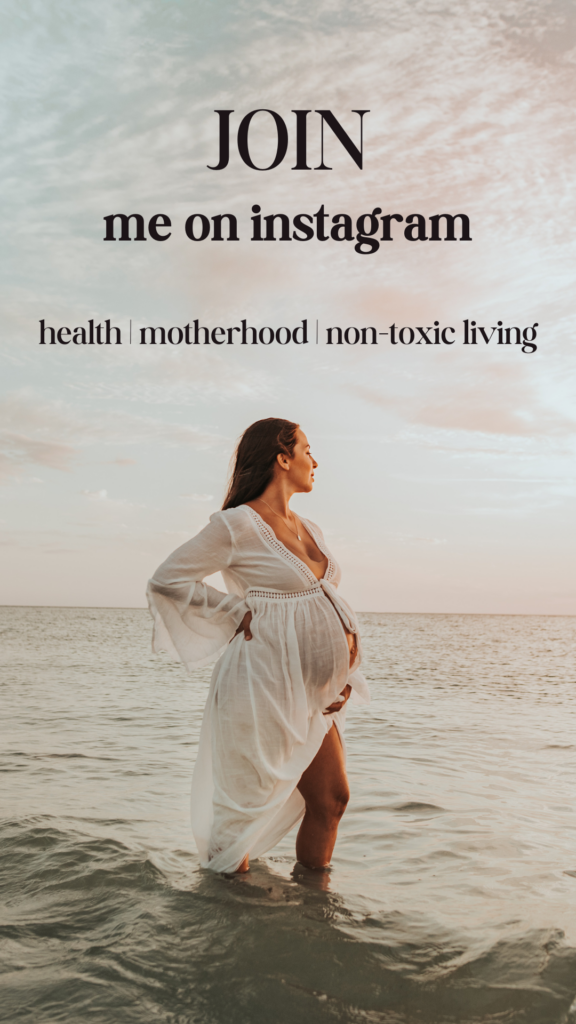Well, hello again! It’s been a long while since I published a blog post… in fact the last one I published was right before we found out we were expecting baby #2! Recipe testing, writing and overall being inspired took a back seat to babying myself while I grow this baby. I announced on Christmas that I am pregnant with another girl, and I knew I’d get a slew of questions on how it happened (considering a lengthy history with infertility and autoimmune disease), how life has been, and how I’ve been managing autoimmune disease during this pregnancy while also parenting a toddler and running a full-time business with Beautycounter.
You also submitted some thoughtful questions that I’m going to answer today in a simple Q&A format to make scanning to whatever questions you’re most curious about easier.
Q: When are you due? When/how did you find out?
A: I am due March 31st, 2019 with a baby girl (we’ve had her name picked out for months!) We had been trying for a second baby casually for about 6 months (essentially not-not-trying) and more seriously for another 4 months before we conceived (within 10 months total) which is a dramatically shorter time than last time. I had been discouraged after months of negative pregnancy tests and a very early chemical pregnancy. After that experience, we decided to stop trying, buy an RV and travel the country for 3 months with Grace during spring of 2019 (we even went to an RV show to pick it out & started loosely mapping our route). About two weeks later, after telling our friends & family of our master plan, we conceived this baby to our surprise. We were even trying to avoid my most fertile days, but with both pregnancies so far, conception has occurred early in my cycle (around day 7-8) versus during the “normal” time of day 10-14.
I tested on day 29 of that cycle (in July 2018) expecting a negative test, as I had been experiencing fatigue and sore breasts and figured my period was just a day late. I was shocked to see a bright blue line appear immediately. Grace and I were home alone, and she was sitting on our bed. In a bit of a daze with a big smile on my face, I scooped her up and told her she was going to be a big sister, and we took a photo together. I actually didn’t tell my husband for 10 DAYS because I was nervous it could result in another early miscarriage, and I am a protector of my emotions. I like to process something first before I share it with others (hence the near third trimester pregnancy announcement).
Q: Did you have morning sickness? How did you stay on a nutrient-dense diet with it?
A: With both pregnancies, I’ve had pretty severe morning sickness, not just nausea throughout the day. From around 5 1/2 weeks to 14-15 weeks, I was throwing up between 2 to 4 times a day and had ALL the food aversions like most moms-to-be. My aversions were the same as last time: animal protein, vegetables (especially raw), warm beverages and basically anything that wasn’t a simple carb or fresh fruit. My meals were very carb-heavy, sometimes just a bowl of pineapple, clementines, grapes and strawberries, other times some gluten-free, egg-free avocado toast with lots of pink salt. For protein, I could manage a few nibbles once or twice a day of seafood like wild salmon or scallops (likely because seafood is easier to digest than chicken, beef or pork). I survived some days on energy balls, green juice, orange/grapefruit juice, and fresh citrus and berries in those early weeks. I wasn’t worried about the lack of nutrient density in the first trimester and simply listened to my body, knowing the nausea and aversions would (mostly) pass like they did last time. Trust that stress during pregnancy over your diet is much more impactful for you and baby than not eating what you consider or a book considers the “perfect” pregnancy diet, especially during the first trimester. For me, first trimester is survival mode.
Q: What prenatal/supplements do you take during pregnancy?
A: During the first trimester and first few weeks of the second trimester, I could not stomach a traditional prenatal, so I did the powdered Nutreince supplement packs that you mix into water in the AM & PM. They don’t taste amazing (I buy the unflavored), but they usually didn’t cause me to throw up like a regular prenatal capsule vitamin did. In my second trimester and beyond, I take the Thorne Basic Prenatal (it’s a very basic multivitamin but it has the proper form of folate for someone with Mthfr, and you only need to take 3 capsules/day versus 8 capsules/day with Seeking Health’s Optimal Prenatal) plus an array of other supplements like Vital Choice’s Wild Sockeye Salmon Oil + Vitamin D, an additional 2,000 IU of Vitamin D drops, Magnesium Glycinate, Trace Minerals in water in the evening, Vital Proteins Collagen Peptides (a scoop in our smoothie each day), and a supplement my functional medicine doctor prescribed to me called Mitocore. I also take a variety of probiotics (when I remember) such as the ones from Hyperbiotics, Jarrow Sac Boulardii (I find it helps with pregnancy constipation) and the prebiotic fiber from Hyperbiotics goes into my smoothies (about 2x a week). I also just added Jarrow Women’s Probiotic to get a variety of bugs and hopefully avoid testing GBS positive this time. I plan to continue all of these supplements post-partum while breastfeeding and beyond.
Q: Should people with Hashimoto’s wait until their antibodies are low to conceive?
A: This is definitely a question for your doctor because antibody levels are so relevant to the person, and just because you do have high antibody levels does not guarantee a miscarriage. You can read more about the connect between thyroid antibody levels and miscarriage, infertility, low birth weight, pre-eclampsia and other pregnancy complications in Dr. Sarah Ballanytne’s aritcle HERE.
I may be a unique case, but I have had elevated antibodies at conception for both pregnancies. There are instances of mothers’ miscarriage coinciding with elevated antibodies, but it’s hard to know if it’s the overall inflammation, imbalanced sex and thyroid hormones or the actual antibodies that is causing the pregnancy loss (or something else, like Mthfr or a genetic or blood clotting issue). For me, remission is TPO antibodies between 30-40 (no matter my diet/lifestyle, my numbers do not fall below this range and that’s okay). My TPO antibodies were 60 when we conceived this baby (I had a slight flare from consuming Four Sigmatics immune-stimulating mushroom tea the month prior – also the month of the suspected chemical pregnancy curiously). When I conceived Grace, my TPO antibodies were in remission but my thyroglobulin antibodies were in the hundreds (I had a very severe flare from switching from synthetic thyroid hormone to porcine thyroid hormone, which my body mounted an extreme attack against that lasted an entire year – this was in 2015).
My thryoglobulin antibodies have remained at a 0 the entire pregnancy, while my TPO antibodies have hung out around 30-40 (most recently a 29). With Grace’s pregnancy, they actually dropped to 0, but I think the level of stress that comes with caring for a toddler (who isn’t the best sleeper), running a business, and not eating entirely AIP (I was mostly AIP with Grace) has caused them to hang out in that range.
The decision to start conception with elevated antibodies is not an easy one, and I certainly don’t feel comfortable recommending waiting until the fall below a certain range OR trying to conceive if you’re in a severe flare. I can’t tell you why my body has been able to carry two babies (so far) with elevated antibodies, but so far both babies have been healthy (fingers crossed since this one is still in my belly!)
Q: What was your thyroid like before you conceived?
My thyroid levels (TSH, free T4 and free T3) were normal at conception but my reverse T3 was slightly high, and my TPO antibodies (as stated above) were slightly high (but I wasn’t feeling flare symptoms). My levels have been wonkier this pregnancy and hard to catch. We haven’t made any adjustments to my T4 medication (Tirosint – a preservative/additive/dye free version of Synthroid) since my numbers still fall in the normal pregnancy range for TSH, free T4 and free T3 (I’m on 137 mcg), but my reverse T3 has crept up. My functional medicine doctor believes its due to mitochondrial insufficiency (essentially not getting ENOUGH nutrients during pregnancy to keep up with my body’s demands AND the growing baby’s demands, which my body will always prioritize). This is why she prescribed me the Mitocore supplement, and I started eating organ meats again as soon as I could stomach them. I’ve never had an issue with reverse T3 before, so it’s something we’re keeping an eye on. I have a full thyroid panel done every 4 to 5 weeks during pregnancy (every 2 weeks during the first trimester). It’s about $32 with insurance, which is the lowest I’ve ever paid for a full panel.
If you want to learn more about why reverse T3 is an important test to include in your thyroid panel, please read this article.. Essentially, high reverse T3 means you’re still in a hypothyroid state (or may be feeling that way) even if your TSH and free T4 and T3 are normal. The thyroid is not a simple organ – it interplays with a variety of bodily systems and finding the right medication dose for you can take months and months – sometimes lowering T4 and adding a small amount of T3 can help bring reverse T3 down, so we are exploring that now.
Read about How I Manage Hashimoto’s During Pregnancy here.
(including how often I have my thyroid tested during pregnancy and post-partum)
Q: Has your diet changed? Do you still drink kombucha?
A: My diet has changed – it’s not quite as nutrient dense as it was with Grace (different cravings but still a whole foods diet). I let myself eat some gluten-free grains, dairy and sugar during the first trimester, if that’s all I felt like eating (like our local gluten free cafe’s amazing carrot cake that I couldn’t stop craving but have since weaned myself from!), but I also majorly crave citrus, salty grassfed steaks, steamed beets, wilted spinach, wild salmon, pistachios, dark chocolate and grass-fed ghee (all good blood-building foods). Now that I’m in my third trimester, meals are more nutrient dense, but I don’t have a large appetite except in the morning and usually later at night, and I can easily go 5-6 hours without eating or just having a small snack. I’ve read the pregnant body naturally falls into a ketogenic state more readily, which is likely why I can keep such a stable glucose levels for a longer period of time during pregnancy (I’m never, ever hangry when pregnant). Whereas with Grace’s pregnancy, I made sure to eat cruciferous veggies and kale 3x a day, this baby seems to want more healthy fats, fruits (pineapple, grapefruit, citrus mostly), cooked spinach, spinach & organic berry collagen smoothies, and beverages (like kombucha, celery juice, red raspberry leaf tea, chicken broth, almond milk, tart cherry juice “spritzers” and orange juice). I’ve actually had a hard time digesting cruciferous veggies even with the proper digestive enzymes!
Other nutrient dense foods I’ve been including once the aversions went away: US Wellness Meats Braunschweiger, sunflower seeds, pumpkin seeds, organic green apples, organic pastured chicken breasts, the occasional grassfed cheddar, sprouted rice, massaged kale salads, grassfed beef (steak, ground, sausage), white sweet potatoes, Medjool dates, and did I mention CRUNCHY SUNFLOWER SEED BUTTER? I’m currently going through a jar every 10 days over here!
I don’t track anything, and I don’t question what I’m eating. I know I could be even “more nutrient dense” or eat more food in general, but I’d rather listen to my body and not stress, knowing this baby will get everything she needs inside and outside the womb, as long as I’m respecting my body’s wishes.
I decided to continue with kombucha this pregnancy, but I don’t make my own. I buy the low alcohol versions from GT’s, Mother Kombucha (a local fave) and Health-Ade (the Pink Lady Apple from Trader Joe’s mmmm!) and drink max 1/2 a bottle (8 ounces) per day with the permission from my midwife. It was one of the first questions I asked her because I missed my ‘booch so much the first go around, and it’s better than drinking the alcoholic cider that I have craved my entire pregnancies (yeesh!)
Q: When did you get your period back post-partum since you did extended breastfeeding?
A: I breastfed Grace from May 2016 to April 2018 (just shy of 2 years). My period returned at the 14-month mark in July 2017, so it was exactly 12 months from that time that we were able to conceive. I weaned from middle of the night feeds around 13 months, which helped my period come back. For reference, I did not have a cycle from the time I was diagnosed with Hashimoto’s in 2008 until right before we conceived Grace in August 2015. For my body to naturally stimulate it’s own cycle in July 2017 was a HUGE health win for me, and it was the first time it had done that in nearly 10 years on its own. I did not experience an autoimmune flare from weaning because we did so very, very slowly. I haven’t had any major autoimmune flares since 2015 – just a couple smaller manageable ones.
If you’re worried about your period not coming back while breastfeeding (and it’s been over 12 months), you could always get a hormone panel done such as the DUTCH test but know that the results will be slightly skewed as your female sex hormones may still be stunted from nursing. I have mom friends who do not get their period back until they’ve weaned completely, and I also have mom friends who don’t get their period back because they’ve lost too much weight breastfeeding, not eating enough calories and exercising too much. We all have a different threshold of sensitivity to our hormonal balance, but if you have lost a significant amount of weight while breastfeeding or you have a disordered relationship with your body, food and/or exercise, it may be time to take a peek into your habits and mental wellbeing.
I also want to point out that to conceive both times, I’ve had to gain weight. I think I would have conceived earlier this time around if I had been at a heavier weight from the start, but I needed to gain 5-7 pounds of fat (doesn’t sound like much, but on a 5-foot-frame, it’s pretty significant) to do so. I was also not exercising during conception other than walking. Previously, I had still been running/sprinting and doing some HIIT workouts at the gym 4 days a week, and waking up early to do them! I got a knee injury, stopped working out, and then conceived this baby within two months, which I don’t think is a coincidence as I was really trying to heal adrenal issues during this time.
Q: Any big differences between this pregnancy and your first?
I would say so! My lifestyle during my first pregnancy was very simplified and easy. I was finishing writing The Healing Kitchen, living in Austin, worked only 20 hours a week at a pediatric clinic as an occupational therapist, hiked and worked out (fairly intensely, still disordered at the time) every day, and had a LOT more time to prepare meals. This pregnancy I’m juggling a 2 1/2 year old (and wanting to soak up every last second of our time with her as an “only child” before baby arrives), working 35-40 hours a week, and fitting in meals and movement when I can. For movement/exercise, I walk between 3 to 4 miles a day with my dog (never breaking a sweat or getting my heartrate up though… he’s an old man) and do yoga 3x a week (at this point, modifying significantly). About 1x a week, I may pick up a set of dumbbells and do some biceps curls and shoulder presses or 50 kettlebell swings, but exercise isn’t at the top of my priority list as I have SPD (symphysis pubis dysfunction), and I don’t want it impacting my labor like it did last time. And simply, I don’t have the motivation to get a heart-pumping work out in – my body has been craving rest more than anything,
My first pregnancy my thyroid was also more stable and I had bounds of energy during second AND third trimester. This time, my energy is more focused on mental efforts and my intense “nesting instinct” and less so focused on my kinesthetic needs. I’m also unable to tolerate cruciferous veggies this pregnancy without getting seriously bloated, the baby is MUCH lower, I have a posterior placenta (makes pregnancy so much more fun now that I can actually feel her little tushy, head and back with my hands), and my anxiety is MUCH lower too (so I’m sleeping better for the most part!) Braxton Hicks started early, I’ve already experienced some labor contractions, and I’ll also be birthing in a birth center this time versus a hospital.
If you have any other questions, please leave them below and I’ll answer them if I can! I will likely be doing a Part 2 to this post as I did receive a lot more questions than addressed above!









18 Responses
How did SPD affect your birth with Grace?
Pregnant here too due 3/20/19! I had amenorrhea before my first (born May 2016) and then once I cut back nursing when my son was 22 months my cycle came back naturally. I conceived this baby a few months later! It’s amazing how the body can change and heal through diet and lifestyle changes!!
I had a very, very long birth (4 full days of non-stop contractions), back labor and a posterior facing baby. I did get a chiropractic adjustment on day 3 of labor that helped speed things along (but it still another 30 hours for her to arrive). It sounds like we had a very similar conception experience this time around – congrats!!
Who is the functional medicine doctor you use? My daughter and I live in central Florida and are looking for a good one to use and are willing to drive some distance if needed.
I go to Balanced Rejuvenation in St. Pete but you DEFINITELY have a functional doctor closer to you! Go the IFM.org website and search your zip code!
What Functional Medicine doctor did you use in Austin? I live just outside of Austin and was recently diagnosed with Hashimotos and feel strongly that this is what has caused my 4 miscarriages (18 weeks, 13.5 weeks, 18 weeks, and 7 weeks). I was started on a low dose medication this week through an Endocrinologist but am very interested in a good Functional Medicine doctor.
In Austin, my OBGYN managed my thyroid during pregnancy (so I wasn’t seeking functional medicine at the time) but after that I went to Wiseman Family Practice (they accepted my insurance and run functional-minded bloodwork and can manage your thyroid). Sending love – I’m very sorry to hear about your pregnancy losses <3
Hi Jordan, I just lost my 5th baby. My reproductive endocrinologist here in GA assures me that it’s nothing to do with my thyroid but like you I can’t help but wonder! Sending love and prayers your way. Miscarriage is so hard.
Hello, I really enjoyed reading this post. Like Jordan above, I just suffered my 5th miscarriage and can’t help but wonder if my losses are connected to my Hashimoto’s diagnosis a year ago. My reproductive endocrinologist that I’m working with now ASSURES me (I’ll admit he’s been doing this for 30 yrs so I’m trying to trust him!) that my Hashimoto’s is NOT what is causing them. My TSH was monitored closely and stayed at around 1 – 1.5 but I still lost the baby at 11 weeks earlier this month. I guess this is a heavy question and I’m not sure if you have any advice, but I’m a little deflated and don’t know where to go from here in terms of helping my body be able to do what it simply can’t do right now (make a baby and keep it). I’m on 50 mcg of synthroid now. I want to try for a baby again but I can’t help but wonder if there’s something else I should be doing. Any advice appreciated xx
Hi Erin ~ I am so sorry to hear about the loss of your babies. Are you getting both your thyroid antibodies monitored prior to conception and during the first trimester as well? If they are elevated, that could be a suspected cause. Another common cause of recurrent miscarriage are blood clotting issues related to the Mthfr gene mutation, which is very common in individuals with Hashimoto’s. Many doctors do not acknowledge the connection between Mthfr and miscarriage and that is likely due to inadequate research, medical school criteria, and simply not understanding the importance of optimal methylation, especially in the first trimester. Have you been tested for the various Mthfr mutations? If you are heterozygous, it’s less likely to have an impact, but if you have multiple mutations or are homozygous, it could certainly be impacting fetal development. Being on prenatals prior to conception that include methylated B vitamins is extremely important (avoid FOLIC ACID in prenatals) and if blood clotting is suspected, being on a blood thinner as soon as you find out your pregnant is often recommended. Sending you love and hoping you find some answers <3
Hi Alaena – Thank you so much for sharing this article. I really found it informative.
Can you elaborate more on your flare up with four sigmatic tea? I coincidentally bought the “mushroom elixir mix” yesterday but am now hesitant to try it after reading your post.
Thanks so much!
I felt immediate Hashimoto’s symptoms and had facial swelling the next day and my doctor tested my antibodies before and after the tea (I probably drank it for 2 weeks) and I had a significant rise in antibodies (from 30 to 70 for TPO) with no other changes.
Hi congratulations to baby number two. I didn’t see your announcement of your pregnancy. But at that time I was working three jobs. I wish you the best of luck. What thyroid meds do they have you on right now? I went to a functional medicine doctor last year but it still has not healed me. I’m so frustrated. I was looking into becoming vegan. What do you think? I’m so over not feeling good so over being overweight.
Congrats on your move. When did you guys leave Texas?
Hi Lisa! I’m on Tirosint (T4) and compounded T3. Before making dietary changes, it may be helpful to get a full thyroid panel done as well as a DUTCH hormonal panel with your functional doctor. I personally do not thrive on a vegan diet as people with autoimmune disease tend to do well on an anti-inflammatory diet rich in wild seafood (we need those omega 3’s and plant based diets are heavy in omega 6s), B12 (from high quality animal products) and tons of veggies and fresh fruits as well as gut healing foods like bone broth. Generally, weight gain with Hashimoto’s doesn’t have to do with your food but with your hormonal balance so that’s the best place to look first for improvement!
Congratulations!!
You said you gained 5-7 pounds before you were able to conceive. Can I ask how you went about doing that?
Simply by eating more and exercising less (I was recovering from an injury)
Thank you for sharing something so personal such as your walk through infertility and Hashimoto’s. I came across your blog and read your post on your second pregnancy. I had saved you IG and was going to get around to reading your story. I finally did. I’ve had three miscarriages last year. Jan 2018 at 17 weeks, June 2018 at 10 weeks and Dec 2018 at 20 weeks. I’ve been seeing a functional doctor for almost 5 years now. I’ve gotten my antibodies and thyroid panel under control. AIP really helped with my antibodies. My TPO is typically around 23 my highest was 40 but by week 8 with last baby dropped to 23. My TSH, FT4, FT3 and RT3 all have been normal. I’m on 90 mg of NP thyroid and 75 mg of synthroid to keep my FT4 at normal range(helped with my temp-use to be cold intolerant). My Thyroglobulin was a bit high and positive for Antinuclear Antibodies. After the second baby I asked to get all the blood clotting testing done as well as MTHFR. To my surprise everything was negative and normal. All these years I had spent more $ for the supplements that are concentious about the MTHFR gene. I’m no longer following AIP, I’ve gained weight from the back to back pregnancies (no real desire to excercise like I use to). But my question to you-is there anything else I’m overlooking? I’ve done my best to be my own advocate based on the information I’ve been presented. I’m now going to seek a recurrent pregnancy loss specialist but I’m curious if you had any insight that I may have overlooked.
Thank you,
-Wendy
Hi,
I’ve only just found out i have hashimotos from a routine blood test that was taken after i fell pregnant with my 2nd.
I.am.struggling. haha
I’m only 8wks and im just finding that im starving, its so restrictive to not being able to eat eggs or cheese esp. I’m only on day 4 of AIP diet…
Do you have any tips or suggestions for getting through this? I’m wondering weather just cutting grains might be enough to begin with?
Would love your help!
Thanks,
Emilly (Australia)
It is normal to be extra hungry when starting AIP – our bodies are adjusting to using a new kind of fuel, lower carbohydrates and it’s easy to accidentally go too low calorie. I would aim for at least 2,000 calories a day starting out on AIP and tracking your food for a week to make sure you’re not undereating. Increasing protein, fats and starchy veggies is likely to help you feel fuller longer! I did a lot of avocado, sweet potatoes, coconut butter, ground beef, and wild salmon during both my pregnancies.